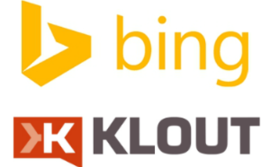Last September, Microsoft began a new relationship with Klout, integrating Klout influencers with Bing social results. That agreement also integrated search results into your Klout score, which users were recently given more control over. Fast forward to today and that relationship has been taken to a new level.
Today, Bing announced Klout-verified Snapshots. Introduced last year, Snapshots contain useful information about people, places, or certain topics, providing quick information at a glance in small boxes.
This new snapshot will enable anyone who signs up to verify and manage how they appear in Bing search results, based on the public portions of LinkedIn and Twitter profiles.
Klout-verified Snapshots will show your:
- Public LinkedIn summary.
- Links to all the social profiles connected on Klout.
- Your Klout score.
- Your influential topics on Klout.
- Two of your most influential public moments from Twitter and Instagram.

To get started, register for Klout and connect it to your LinkedIn profile. Then, sign up for Snapshot on Klout. After signing up, you’ll have the option to tag yourself in Bing search results. This essentially performs a search for your name and allows you to select the results that mention you in an effort to get the ball rolling, so to speak.
Celebrities Need Not Apply
Search engines in general have typically reserved their side-column results for more well-known people and celebrities. This change allows literally anyone to control how they appear in search results. It certainly appears to make Bing more relevant for searching individuals.
“Klout’s deep expertise in understanding influence is an ideal match for those who come to Bing seeking answers,” said Sanjay Desai, Senior VP of Product at Klout. “With the launch of Klout Verified Snapshots on Bing, people will now be empowered to control how their online identity – from personal to professional – is presented in search results.”
Who knows, will it eventually become the way recruiters research potential candidate’s LinkedIn information? Will it change the way you search for people or how you think about your LinkedIn profile? More importantly, how will this play out with the new partnership between Bing and Siri?

